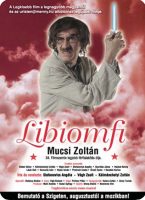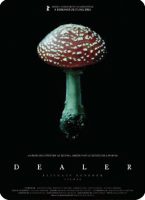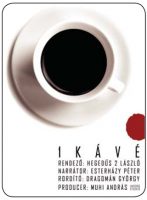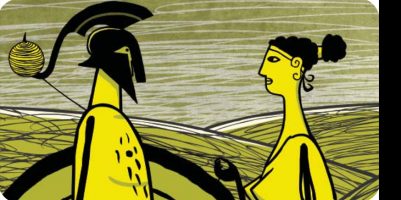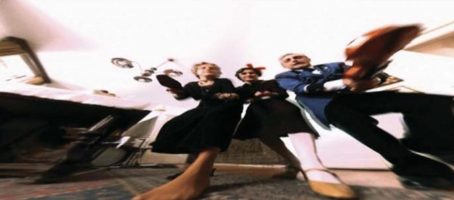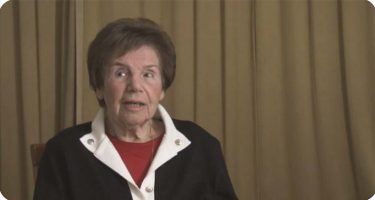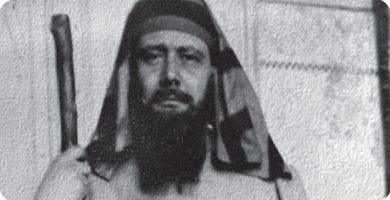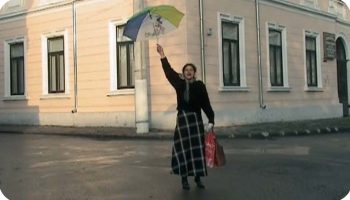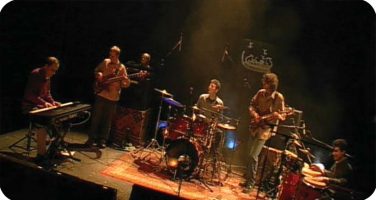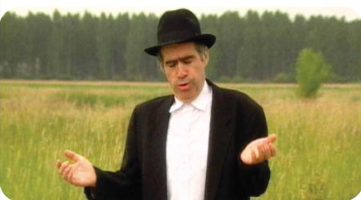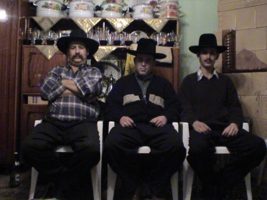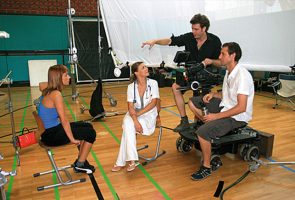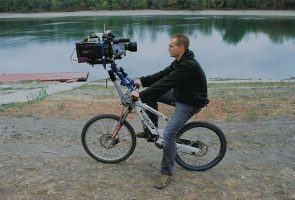






























interview with the directors
Inforg Studio was a key player in the boom of Hungarian short and feature film production around the turn of the millennium, a real workshop producing hundreds of experimental and short feature films. Inforg Studio’s short films are proof that it is freedom, the almost total absence of formal constraints, that allows the widest scope for creativity. The short film is the haute couture of cinematographic thought: it is not bound by the rules of the confection or the time-frame of the film, but only by the idea, the creativity and the amount of money available, but the latter is not necessarily a limit, because with less money another idea, adapted to the size, can be realized just as demanding and successful. One of the driving forces behind the whole story of Inforg Studio is the dynamic between short and feature film, building from the short to the long format. The many successes, both in terms of festival awards and audience attention, and the organic development of successful short filmmakers into successful feature film directors, have made Inforg Studio one of the most influential film studios of the millennium. A real team where filmmakers with a passion for film came together, found support and encouragement, and got help to make a film, however strange of an idea it was. So that what was made would not remain invisible, and what was valuable would not be left without a sequel. The great loss of Hungarian film is that this team has been disbanded, the workshop in its former form has disappeared.
Teréz Vincze, excerpt from her essay for the exhibition catalogue, The haute couture of cinematic thought, p. 108.
The exhibition is accompanied by portrait films with the filmmakers of Inforg Studio, Viktor Bodó, Krisztina Bódis, Tamás Buvári, András György Dési, Gábor Móray, Cecília Felméri, Benedek Fliegauf, Marcell Iványi, Sándor Kardos, Zoltán Kálmánchelyi, Angéla Stefanovics, Zsolt Végh, Bálint Kenyeres, Róbert Lakatos, András Muhi, András Pires Muhi, Lehel Oláh, Péter Politzer, Anita Sárosi, István Szaladják, Attila Till, Ágota Varga, Márton Vécsei, Roland Vranik, which show what the spirit of this flourishing film workshop meant to the generation that started out in the 2000s. László Hartai, Klára Muhi and András Muhi talk about the birth of Inforg studio. An interview with László Nemes-Jeles is on display at the exhibition.
The portrait films were made by Erika Kapronczai, film director, in the summer of 2021.
The accompanying texts were written by Brigitta Iványi-Bitter PhD, curator of the exhibition.
Kriszta Bódis
Kriszta Bódis, film director, writer and social activist, met the open-minded and interested producer at Inforg Studio in the early 2000s, who enabled her to make courageous documentaries about people on the margins of society and silenced taboo subjects. Thus, in his documentary film Village Romance – Gay Love (2007), he challenges both the hiding of LGBTQ community and prejudice against Roma. His documentaries Slave Market I and II (2002-2003), which explore the slave trade in Hungary, also show the lives of vulnerable young Hungarian women by exploring their everyday lives. Kriszta Bódis is a multi-award-winning documentary filmmaker at Inforg Studio, who continues to successfully pursue her creative and activist work after 2010, the latter under the auspices of the Van Helyed Foundation (Hungary).
Viktor Bodó
Viktor Bodó became involved in the fledgling life of Inforg Studio during the making of his short film Lemon Head (2001). He recalls that early heyday, while we learn how much it means to a fresh young filmmaker when the producer is open, interested and supportive of the new film project as it unfolds. He recalls two important memories, one of being both amused and encouraged by András Muhi’s “bold filmmaking statement” comment during a screening of one of his experimental films, and of watching the producer carry a large desk calendar, of course, totally filled with tasks and appointments.
Tamás Buvári
Tamás Buvári joined Inforg Studio in the early 2000s, his first film was Waiting for Vladimir, a black and white adaptation of Waiting for Godot, and in 2004 he made his short film Postsoldier, which won the Hungarian Film Critics’ Award and was a competition film at the Venice Film Festival. It also meant a lot to Buvari to leave the solitary life of a filmmaker and join a new film community and a film workshop community at Inforg Studio. We can learn from him how important the open and supportive attitude of Inforg’s producer was for the directors.
György András Dési
András György Dési and Gábor Móray have been making films together for decades. In 2003, their evergreen film Hit me! was made at Inforg Studio.Based on an excellent script, it is a superbly shot black and white short film with a deep psychological portrayal of the social tensions of the 2000s, featuring Zsolt Anger and Zoltán Mucsi in a memorable performance. In 2004, they made their short film Jocó, which introduces the life of a small-town policeman with a sweetly mischievous sense of humour.
Cecília Felméri
Cecília Felméri enriched the palette of Inforg with the culture of Transylvanian filmmakers. In 2008, she made her short film Cacoo, which introduces the viewer to the world of Transylvania through a love triangle story with a special humour and sensitivity. Her film was screened at the Warsaw Film Festival, won the main prize at the Cluj Film Festival and was awarded the National Student Jury and Edupress prizes for the most promising young talent at the Hungarian Film Festival. Her latest feature film, Spiral, was released in 2021.
Bence Fliegauf
Many people may have first seen Bálint Kenyeres as a character in Bence Fliegauf’s 2003 film Forest. However, Kenyeres is also a filmmaker himself, and one of his most successful Inforg Studio projects is the short film Before Dawn, which won the European Film Academy’s Best Short Film Award in 2006, a certificate of distinction at the Sundance Film Festival, and was a competition film in Cannes and Karlovy Vary. The film’s crew members are Mátyás Erdély, cinematographer, Péter Politzer, editor, and Tamás Zányi, sound engineer. Before Dawn is a poetic, slow-moving one-shot film in which the story slowly reveals itself in the monotony of the wheat fields, with the sudden drama unfolding upon the arrival of a lone truck. Technically, this is a very high quality, visually superbly composed work from Kenyeres.
László Hartai
The birth of Inforg Studio – founders: László Hartai, András Muhi and Klára Muhi. The foundations of the Inforg brand go back to the 90s, where three intellectuals, committed to the highest tradition of filmmaking, search for paths to follow. In this portrait film, we get some insights to what it was like to move from the public sector to the private sector after the regime change in 1989, to take risks and to take on filmproduction or film education tasks in Hungary, changing the beaten track for the unprecedented.
Marcell Iványi
Marcell Iványi made his short feature film Ballad at Inforg Studio in 2006. This minimalist film tells a story reminiscent of a ballad in a visual world created by painted backgrounds, reminiscent of animated films. The film was inspired by a famous Italian painting (Giuseppe Pellizza da Volpedo: Il Quarto Stato, 1989-1901), also quoted by Bertolucci, which symbolises the peasant uprising in Milan. The film unfolds the characters of this painting in a fictional story. The film was in the competition programme of the Venice Film Festival.
Sándor Kardos
Sándor Kardos has made some of Inforg Studio’s most notable experimental short films. In his 2005 short film Slit-film, he adapted a Japanese short story using a slit camera to show space in time. Kardos took an innovative approach to the representation of space with the camera and successfully built a camera that could represent space in 360 degrees. His 2009 short film The Metamorphosis, was made with similar cinematography using a camera consisting of 6 lenses and CCD plates behind them, as an adaptation of Kafka’s book. Given that the apparatus is very similar to the eye of an insect, it processes Kafka’s story from beginning to end from the subjective point of view of a beetle.
Zoltán Kálmánchelyi
Zoltán Kálmánchelyi, Angéla Stefanovics, Zsolt Végh are the emblematic trio of Inforg Studio, who jumped into filmmaking with endless humour and enthusiasm within the framework of Inforg Studio. Their name is associated with one of the studio’s first best-known short films in Budapest, god@heaven.hu (uristen@menny.hu), which was made in 2000, when Inforg was launched, and it went on to win the Hungarian Film Week’s main prize for short films (shared main prize). As the authors put it at the time, “The story is set here and now in our small country, where even God can’t find his way.” In 2001, they presented their short film “The smallest film about the biggest Hungarian, or no hands, no chocolate”, a reflection on the giant film production (The Bridge Man) of that year that divided the film scene of the time. Their feature film Libiomfi (2003) is an entertaining portrayal of the story of a mad theatre director. The genre of the film was described in the studio’s catalogue of the time as a tragicomic socio-fairytale-musical. Libiomfi won the Best Actor Award, the Student Jury Special Prize and the Best Producer Award at the 34th Hungarian Film Festival.
Bálint Kenyeres
Many people may have first seen Bálint Kenyeres as a character in Bence Fliegauf’s 2003 film Forest. However, Kenyeres is also a filmmaker himself, and one of his most successful Inforg Studio projects is the short film Before Dawn, which won the European Film Academy’s Best Short Film Award in 2006, a certificate of distinction at the Sundance Film Festival, and was a competition film in Cannes and Karlovy Vary. The film’s crew members are Mátyás Erdély, cinematographer, Péter Politzer, editor, and Tamás Zányi, sound engineer. Before Dawn is a poetic, slow-moving one-shot film in which the story slowly reveals itself in the monotony of the wheat fields, with the sudden drama unfolding upon the arrival of a lone truck. Technically, this is a very high quality, visually superbly composed work from Kenyeres.
Róbert Lakatos
Róbert Lakatos, a Transylvanian filmmaker, came across Inforg Studio at the beginning of his career, where he found a professional and progressive environment, thanks to which he made several successful short films and documentaries at the studio between 2000-2010. His documentary Land of Silence (2002) won the Film Critics’ Award. The director from Cluj was interested in universal human problems, unique inner worlds and the representation of the Gymes-land beliefs. His 2004 short film Devil’s Knee won a Filmszemle in the short feature category. Bahrtalo! Good Luck!, his 2008 feature film won an award at Karlovy Vary (Europa Cinemas Label East of the West).
Gábor Móray
András György Dési and Gábor Móray have been making films together for decades. In 2003, their evergreen film Hit me! was made at Inforg Studio.Based on an excellent script, it is a superbly shot black and white short film with a deep psychological portrayal of the social tensions of the 2000s, featuring Zsolt Anger and Zoltán Mucsi in a memorable performance. In 2004, they made their short film Jocó, which introduces the life of a small-town policeman with a sweetly mischievous sense of humour.
András Muhi
András Muhi, executive producer and CEO of Inforg Studio Ltd, who was committed to building the studio’s circle of directors on a meritocratic basis. His agenda was to discover talent and create career-starting opportunities, with a strong profile to give new Hungarian talent, regardless of education, a filmmaking opportunity. He also maintained excellent relations with the older generations of Hungarian cinema, many of whom were part of the studio’s educational programme (Herskó, Jancsó). András Muhi built a new ecosystem at the studio in the 2000s, combining the best of Hungarian filmmaking traditions into the activities of the new generation and building an international film network through co-productions and successful international film festival appearances. András Muhi was one of the first producers after the 1989 regime change to lay the foundations for the development of the producer position in Hungary through independent task assignment, studio building with a strong profile and a programmatic value system. There was no institutional training or any example set for producers back then. The colourful palette of Inforg studio covered the Budapest lifestyle of the time, and András Muhi had his hand on the creative pulse of the city.
Pires Muhi András
Director and producer András Pires Muhi (the son of András Muhi), whose recent documentary about 3 times gold winner Olympic fencer Áron Szilágyi was a great success, introduces us to the family life of the producer of Inforg Studio. He tells us what it is like to be born into a family business of filmproduction, where parents and children alike are committed to high quality filmmaking. He has been influenced throughout his life by the Inforg phenomenon, the world of Inforg directors and cinematographers, and his father András Muhi and his attitude towards filmmakers and himself.
Klára Muhi
The birth of Inforg Studio – founders: László Hartai, András Muhi and Klára Muhi. The foundations of the Inforg brand go back to the 90s, where three intellectuals, committed to the highest tradition of filmmaking, search for paths to follow. In this portrait film, we get some insights to what it was like to move from the public sector to the private sector after the regime change in 1989, to take risks and to take on filmproduction or film education tasks in Hungary, changing the beaten track for the unprecedented.
Lehel Oláh
Lehel Oláh is one of the most prolific filmmakers at Inforg Studio, and has been present in the studio from the very beginning. In 2001, producer András Muhi gave him one of his favourite subjects, as a former director of the Csepel factory, he noticed the big garage band rehearsal life in the factory’s underground shelter catacombs. Oláh was delighted to take up the subject in his documentary Music Shift, which captures how 30 bands play in 19 concrete shelters in the evenings during the night shift at the factory. His 2004 documentary Dixi was a continuation of his coverage of the underground music scene, capturing the emblematic underground figure of the era in sensitive portraits, an irreplaceable document of the times. Also in 2004, his documentary Junking follows a district-by-district garbage dump in Budapest, which the director himself refers to as a socio-rode-movie. His 2006 documentary Holidays is a subjective look at the sublime and profane moments of the official holidays during the course of an year in Budapest, with lots of music. Oláh has also experimented with fiction films, one of his best known and widely screened works is his romantic short film After Five before Six, which tells the imagined and real story of an adulterous affair in 16 minutes. His earlier short films have had a similar love theme, such as Horribile Dictu (2000) and The Prey (2000).
Péter Politzer
Péter Politzer is a pillar of Inforg Studio, who has edited many films while directing his own. As an editor, he is credited with short films by Kenyeres and Nemes Jeles, Attila Kispál’s feature film The Paths of Light, Kardos’ Slit-film and The Transformation, as well as Libiomfi, to name but a few. As a director, he also made outstanding films, in 2003, he made a war-themed short film, Grenades, about the hunt for hiding rebels by the military. Thanks to the dramatic tension of the tense moments and the technical excellence of the film, it competed at the Cannes Film Festival and won the 34th Hungarian Film Festival Short Film Director’s Prize. In 2006, he made one of the studio’s most expensive short films, Silent Night, which tells the story of Christmas Eve. It is a war atmosphere in the dense forest where mysterious things happen in a lonely forester’s house, starring Vilmos Vajdai. The film won the Silver Remi Award at the Houston Worldfest.
Anita Sárosi
Anita Sárosi is a media artist, designer and experimental filmmaker at Inforg Studio. Her 2005 short film Avatar, which was also part of a media art installation at c3 Gallery in Budapest, was made with digital animation with technical support from MTA Sztaki and C3. Although the video game Second Life was already becoming quite popular, avatars were not as evident a part of everyday life back then as they are in the 2020s. Therefore, the choice of the theme itself and the way it is dealt with is close to futurology. Anita wrote about it in the studio catalogue: “I decided to go into virtual space and create my own avatar, with the help of the technical tools, that surround us to choose our very own reality.”
Angéla Stefanovics
Angéla Stefanovics, Zoltán Kálmánchelyi, Zsolt Végh are the emblematic trio of Inforg Studio, who jumped into filmmaking with endless humour and enthusiasm within the framework of Inforg Studio. Their name is associated with one of the studio’s first best-known short films in Budapest, god@heaven.hu (uristen@menny.hu), which was made in 2000, when Inforg was launched, and it went on to win the Hungarian Film Week’s main prize for short films (shared main prize). As the authors put it at the time, “The story is set here and now in our small country, where even God can’t find his way.” In 2001, they presented their short film “The smallest film about the biggest Hungarian, or no hands, no chocolate”, a reflection on the giant film production (The Bridge Man) of that year that divided the film scene of the time. Their feature film Libiomfi (2003) is an entertaining portrayal of the story of a mad theatre director. The genre of the film was described in the studio’s catalogue of the time as a tragicomic socio-fairytale-musical. Libiomfi won the Best Actor Award, the Student Jury Special Prize and the Best Producer Award at the 34th Hungarian Film Festival.végh
István Szaladják
Director-cinematographer István Szaladják was an important member of the studio. He played a particularly important role in the beginning, as he made the studio’s first award-winning film, Golden Bird. The producer was so impressed by the film’s design that he became increasingly inspired to create a larger-scale black-and-white short feature. The film was originally to include thousands of photographic paintings, yet this was not realised, but through outstanding cinematography and direction, Szaladják managed to turn the film into a poetic, philosophical work that explores the evergreen philosophical questions of human life. Choosing a medieval quotation, he has created a film with a truly archaic atmosphere, opening up to the viewer the inner monologue of a crusader.
His 2006 feature film, Bird Release, Cloud, Wind, is a similarly melancholic and philosophical film as Golden Bird.
István Szaladják has also been a major professional pillar of the studio as cinematographer for several Inforg films, including Closure (2000), Alexandrian Tobacco (2000), Grenades (2004) and Silent Night (2006).
Attila Till
Attila Till, media artist and TV presenter, has been active as a film director for decades.His 2008 film Panic dealt with a psychological problem that was little discussed in Hungary at the time, the topic of burn-out and panic disorder among senior managers. Her protagonist Zsuzsi (Ági Gubik), who by the age of 30 had become a successful PR director, could have been happy, but one day she has a panic attack. The film is about the intricacies of her incipient, malleable treatment of this illness, and at the same time about the sweet and bitter thrills and dangers of treating it without strict medical protocol.
Ágota Varga
Ágota Varga has made several important and insightful documentaries under the auspices of Inforg Studio. The cover story MN 1480 (2009) is about the secret combat missile brigade of the communist era. The Cholnok Prison Camp (2007) is about the lives of 2,000 political prisoners who were released during the 1956 revolution and then the state covered their tracks in the 1970s. Descendants (2005) explores the relationship between their fathers and grandfathers and the descendants of the State Secretary of the Interior who led the ghettoisation and concentration camps for Hungarian Jews. Good luck, folks! (2006), Acac Street (2004), The Poet and the Miner (2004) are mainly portraits of rural people who are segregated and disadvantaged because of their Roma origin. The documentary The Light of Our Eyes, which will be on show in the exhibition, is not a politically themed exploration. It is about a blind couple who have adopted a child. For weeks, the camera follows the strange yet happy ensemble of these three people, revealing the social and physical support that young families with multiple disadvantages were able to live with in Hungary in the 2000s.
Márton Vécsei
Márton Vécsei continued his fine arts studies at the Hungarian Fine Art Academy in the class of Dóra Maurer, the world-famous experimental filmmaker, and then became interested in fiction filmmaking at the Hungarian Academy of Theatre and Film. He made documentary films in Transylvania, the most outstanding of which is Far Away, in which he strives to capture the spontaneous magic of the Transylvanian village life. He has always been interested in making fiction feature films. He has a passion for combining documentary filmmaking and cinematography. The spirit of Inforg Studio also had a great influence on him, and he still considers its value to be outstanding.
Zsolt Végh
Zsolt Végh, Zoltán Kálmánchelyi, Angéla Stefanovics are the emblematic trio of Inforg Studio, who jumped into filmmaking with endless humour and enthusiasm within the framework of Inforg Studio. Their name is associated with one of the studio’s first best-known short films in Budapest, god@heaven.hu (uristen@menny.hu), which was made in 2000, when Inforg was launched, and it went on to win the Hungarian Film Week’s main prize for short films (shared main prize). As the authors put it at the time, “The story is set here and now in our small country, where even God can’t find his way.” In 2001, they presented their short film “The smallest film about the biggest Hungarian, or no hands, no chocolate”, a reflection on the giant film production (The Bridge Man) of that year that divided the film scene of the time. Their feature film Libiomfi (2003) is an entertaining portrayal of the story of a mad theatre director. The genre of the film was described in the studio’s catalogue of the time as a tragicomic socio-fairytale-musical. Libiomfi won the Best Actor Award, the Student Jury Special Prize and the Best Producer Award at the 34th Hungarian Film Festival.
Roland Vranik
Roland Vranik made one of his first important feature films at Inforg. His film Black Brush was made with Gergely Pohárnok and produced by András Muhi, in collaboration with Filmteam and Filmpartners. In this amusingly clumsy film about four chimney sweepers, we can feel the experience of life of the young generation of the 2000s, the humour of surreal everyday life in its uncertainty and unpredictability. The film is the story of a day. It involves chimney sweeping, debt, gambling, pubs, goats and mind-altering drugs. The film is characterised by funny yet real characters, great acting and quality cinematography. In this interview, Vranik also reveals that filmmaking is a compulsion, an inner drive that is not supported by the need for certain success, and he also tells us what the ideal film support system is from the director’s point of view.

